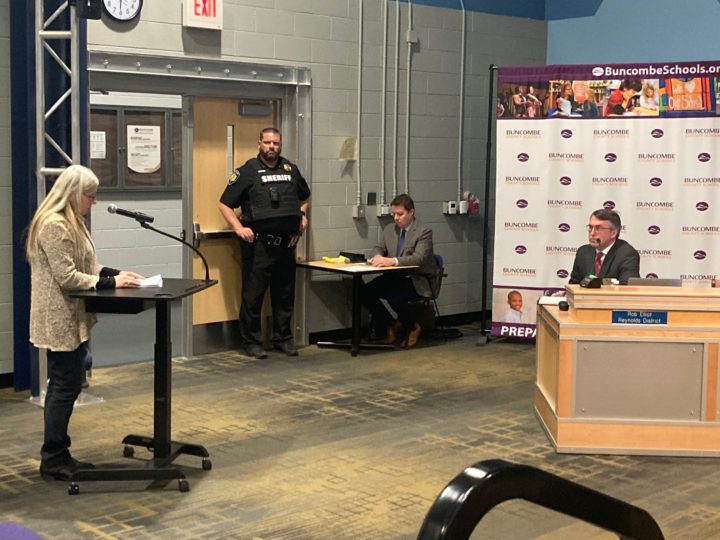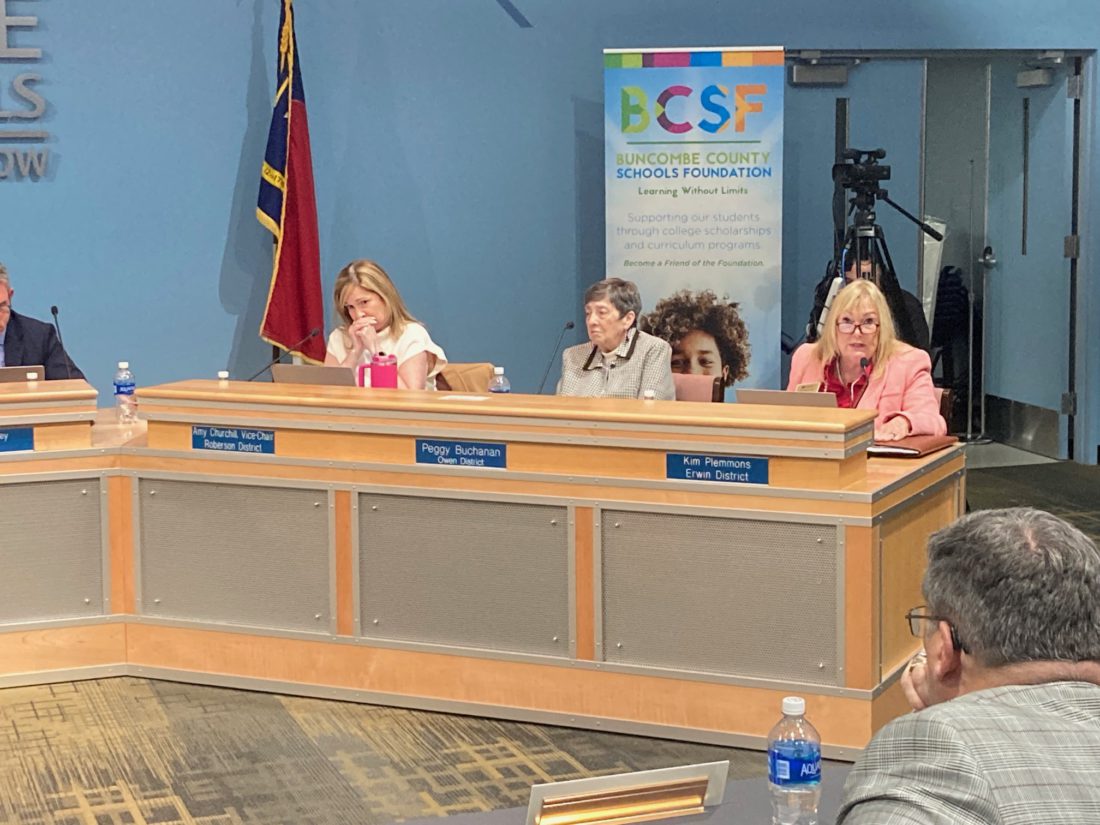One month after banning a book from all district high schools, the Buncombe County Board of Education unanimously agreed at its March 7 meeting to keep nine others available to students at Enka High School.
The decision follows the recommendations made by the district-level Media and Technology Advisory Committee after four parents appealed the school-based committee’s initial November ruling to keep the nine books — and one other — in the school. The district-level MTAC deliberated over several meetings in January before coming to a decision Feb. 6.
The books under review cover topics ranging from suicide, transgender identity, family tragedy, drug use and addiction to sexual exploration, sexual assault and police violence, according to district documents.
“We are not banning books — we’re simply asking that age-inappropriate books be removed from a library designed for minors,” Kim Poteat, one of the parents who appealed the school committee’s initial ruling, said during public comment. “Banning a book means it is not accessible. These books are still accessible in the public sphere. We are simply asking that parental rights be respected and parents be given the freedom to choose the timing of when their children are exposed to modern real world social issues based on their family beliefs, not the beliefs of educators.”
Mitchell Cohen, a junior at Martin L. Nesbitt Jr. Discovery Academy, disputed Poteat and others’ claims that removing a book from a library does not equate with a ban.
“You are here to educate us, you are not here to shelter us,” he said. “And to further address the claims that just removing books from school libraries is not banning them: This is blatantly untrue. Because removing a book from the school library means that countless students will not be able to read that book. Many students do not have access to free libraries, and many more students cannot afford to buy those books.”
Cohen added that he has learned a lot by reviewing books with difficult topics in a classroom setting and that removing them diminishes the power of teachers.

In all, 10 residents — including eight students from Nesbitt Academy — spoke out against the removal of books from school libraries, while six spoke specifically in support of certain books’ removal.
“People will argue that book bans protect children from dangerous concepts,” said Paul Curran, a senior at Nesbitt. “They don’t want to see their kids see challenging content such as sexual themes, violence, discrimination and drug use. Is this not the point of these books to challenge difficult topics to expose people to the very real dangers present in our society?”
Poteat argued that not all children are ready to consume such sensitive material.
“Many [parents] are taking children to foster or adopt after they have been traumatized. For these children, the lines between right and wrong are blurred,” she said. “They do not know how to have honest communication. What about these parents? I represent these parents, I foster children and am currently raising two adopted children. It’s not easy. We need our schools to work with us.”
The books up for consideration at the March 7 meeting were: 13 Reasons Why by Jay Asher, Beyond Magenta by Susan Kuklin, Extremely Loud & Incredibly Close by Jonathan Safran Foer, Go Ask Alice by Anonymous, Looking for Alaska by John Green, More Happy Than Not by Adam Silvera, Shine by Lauren Myracle, The Hate U Give by Angie Thomas and The Kite Runner by Khaled Hosseini.
Board member Rob Elliot commended staff and members of the school and district MTACs for their careful consideration of parents’ objections.
“[It takes] hundreds of people volunteering their time in our community to respectfully handle these requests, respectfully listen to all sides, respectfully listen to the educators and experts in the room and come to reasonable conclusions,” he said. “That’s not easy. And it doesn’t all just fall on us. You know, it’s a big committee and community decision.”
Later in the meeting, the board heard a policy change allowing the board to remove a book from all schools if it removes it from one, as recommended by board member Amanda Simpkins at the February board meeting. That policy still has to go through a second reading before being passed.
So far, while BCS has banned one book districtwide — Tricks by Ellen Hopkins — three were removed from circulation at Enka High School in December. Those are Doing It! Let’s Talk About Sex by Hannah Witton, Nineteen Minutes by Jodi Picoult and Wicked: Life and Times of the Wicked Witch of the West by Gregory Maguire.
Those three are still available at other high school libraries in the district, and several parents argued they should be removed districtwide at the March 7 meeting.
Board passes new electoral maps
Unanimous in its monthslong frustration with a process mandated by the N.C. General Assembly, the BCS board passed new electoral maps to be used in the November general election.
“I am very much against this,” said board member Kim Plemmons. “I want to put it on record that this is probably the most ridiculous thing that we have had to deal with since I’ve been on this board. We should be focusing on kids and our schools, not this kind of partisan politics.”
Out of three options designed by Adam Mitchell of Tharrington Smith LLC and Blake Esselstyn of Mapfigure Consulting, option C was chosen by the board because it created the least amount of change in the current district lines, Elliot said.
Since 1975, Buncombe has elected one school board member to represent each of the county’s six attendance zones — Enka, Erwin, Owen, North Buncombe, Reynolds and Roberson — and one at-large member. Candidates had to run in the district they lived in on a nonpartisan basis, and residents could vote for all school board members, regardless of their address.
Voters who live in the newly drawn districts will vote only for the representative running in the district in which they live. The law doesn’t change where students will go to school, only school board representation.
The new maps had the biggest effect on the Reynolds attendance zone, where 27% of families will have different board representation after the maps are implemented.
“The unfortunate truth about this is that we are about to vote for or against a resolution that none of us think is right,” Simpkins said. “But ultimately, we’re put in a position where we have to follow the law.”
Despite the board’s reservations, the new maps passed unanimously.



It’s my understanding that The Adventures of Tom Sawyer and Huckleberry Finn, a classic written by Mark Twain, is also a banned book in public schools. Many on the left have no problem with censorship and book banning so long as it fits a certain narrative.
“Many on the left have no problem with censorship and book banning so long as it fits a certain narrative.”
Which is exactly what the right is doing in this case.
The far left and and far right are really just opposite sides of the same coin.
Ban Huck, and I’ll burn the flag. What we really need to ban is inbred insurrections….
That horse has left the barn.. (a) Most students can’t or won’t read books anyway. (b) All student’s have access to computers and can and do view all manner of orientations and genders engaged in various porn activities on FREE porn sites with no subscription or payment required.
I’m troubled by folks who claim that they don’t want to “co-parent” with the government, and yet ask the government to impose their personal biases on everyone else’s children. Removing a book from library shelves is, in effect, banning it for the student who cannot afford to buy books or has no access to public libraries. That was me, when I was a kid. Books can be a safe space in which to gain knowledge about the real world. Please–talk to your children, find out what they are reading, and discuss it with them.
Contraception ed must be completed before physical fertility and no concept of “age appropriate ” gets to violate that fundamental mandate; and this is about high school, where most students have been fertile for some time. failure to teach contraception by fertility exploits childless taxpayers.
It does seem, however, like big pharma may be pushing their gender therapies. If they do this to cause sterility and save the environment and school tax, they should say so.
Also, Asheville City Schools can’t possibly even consider merging with book banning district.